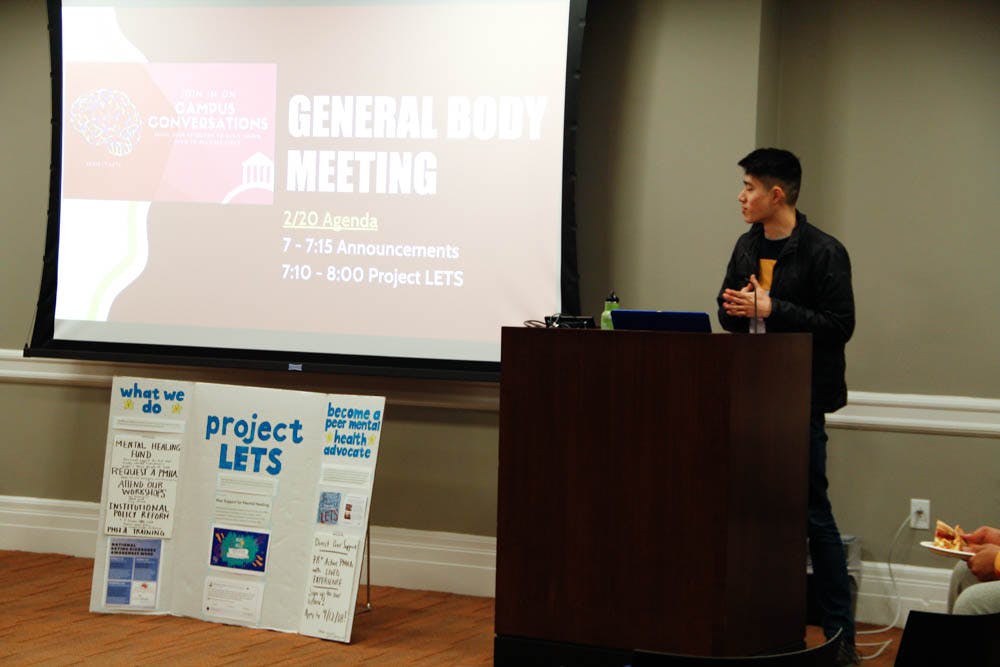The Undergraduate Council of Students unanimously voted in favor of four changes to the UCS and Undergraduate Finance Board Elections Code and heard from a Project Let’s Erase the Stigma representative at its general body meeting Wednesday evening.
This year, candidates for UCS President, UCS Vice President, UFB Chair and UFB Vice Chair will be required to collect 200 signatures from their peers, while candidates for all other positions now only need 100 signatures. Last year, the Elections Code was changed so that all candidates needed to receive 200 signatures from registered undergraduate students in order to run, The Herald previously reported.
“We think this is a good balance because (the reduction is) for the positions that are less of a time commitment, but it’s still substantial enough that people have to go out and talk to people about their campaign,” Elections Board Co-Chair Katie Barry ’19 said. Two years ago, candidates for top executive positions in each body had to obtain 400 signatures and candidates for all other positions had to obtain 250.
Other Elections Code changes include allowing students on leave or abroad to vote, formally establishing that the candidates meeting occurs no fewer than seven days before elections begin and automatically entering all candidates for UFB Chair and Vice Chair into the race for UFB Representative. The Elections Board proposed the latter change “so that if someone runs for chair and they lose, they aren’t automatically kicked off of UFB,” Barry said. All of the changes will apply in the upcoming election process slated to begin with three information sessions held over the next week.
At the meeting, Project LETS Chapter Co-Coordinator Matthew Flathers ’19 discussed Project LETS’ initiatives and answered questions about the group’s work.
“We want to make sure that every student who identifies as having a mental illness, as neurodivergent or disabled, has support both on an individual and an institutional level,” Flathers said about the chapter’s guiding mission.
Project LETS’ Peer Mental Health Advocate program reflects the organization’s focus on individual support, Flathers said. PMHAs are individuals who have lived experiences with mental health issues and are trained to support other students.
Project LETS also has open general body meetings to “make sure students feel supported by (the University) itself,” Flathers said. The group hosts workshops, collaborates with other campus groups and works with administrators to reform University policies related to mental health, such as the medical leave policy, he added.
Project LETS aims to be “completely open” in order to provide a “space for students who have lived experience, because there’s not always a ton of space to talk about these issues on campus,” Flathers said.
UCS Vice President William Zhou ’20 asked about instituting stipends for PMHAs during the question-and-answer portion of the meeting.
Flathers noted that Project LETS has had ongoing discussions with the University about stipends, but the emphasis the organization places on being a confidential resource can complicate those conversations.
“It becomes challenging when you have to deal with a larger institution where issues of liability get much larger,” Flathers said. In these discussions, the goal is to “navigate how can we make things (as confidential) as possible while also trying to integrate more within the University system to allow for things like stipends” for PMHAs, he added.
UCS President Shanzé Tahir ’19 asked about the Mental Healing Fund, which offers small amounts of funding to individuals who otherwise would not be able to afford longer-term therapy off-campus. The Mental Healing Fund is run through the Project LETS national organization and was instituted at the University in response to student experiences with Counseling and Psychological Services’ short-term model. CAPS used to have a seven-visit limit that has now been removed, following Project LETS’ advocacy work with administrators, The Herald previously reported.
Students’ “options were to spend a lot of money to go off-campus to see someone, or just continue working on it on their own,” Flathers said. “So our goal is to … find a way to make financial obstructions be less burdensome.”
UCS Appointments Chair Jason Carroll ’21 asked how UCS could further support Project LETS.
“A lot of it is just spreading the word. We predominantly have reached certain communities on campus, and there’s still a lot of specifically marginalized communities that we don’t see coming to our workshops or we don’t see collaborations happening (with),” said Shivani Nishar ’20, incoming Project LETS chapter co-coordinator and UCS chair of student wellness. “What we really look for … is having students bring up these events to their specific communities.” These are often communities in which there exists a cultural stigma surrounding mental health, Nishar added.
UCS Chief of Staff Molly Naylor-Komyatte ’19 asked what makes the Project LETS chapter at the University different than at other institutions.
“We have a lot more institutional support than a lot of the other chapters do,” Flathers said. “It’s not always been that way. It is a battle to get there. And so the other chapters are beginning that battle now.”
Correction: Due to an editing error, an earlier version of this article was titled "University Council of Students approves changes to Elections Code." In fact, the Undergraduate Council of Students approved the changes. The headline is now "Undergraduate Council of Students approves changes to Elections Code." The Herald regrets the error.





